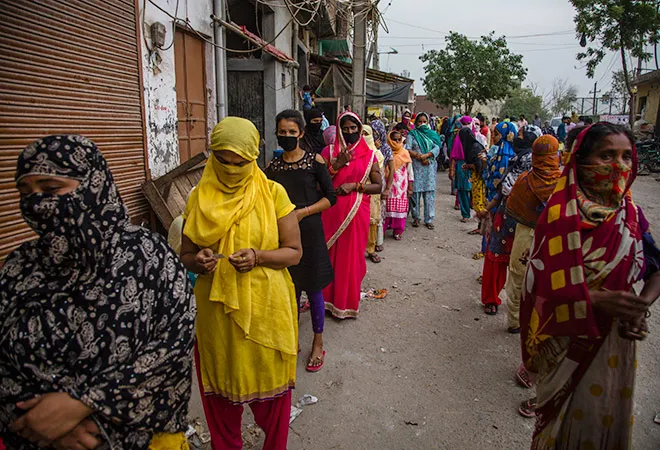The outbreak of the Covid-19 pandemic catapulted an extraordinary situation that the world is grappling with. India, being a thickly populated country, also had to brace up for the humongous health crisis that Covid-19 has precipitated. As soon as the spread of the disease was becoming apparent in the country in the month of March, the Indian state realised that tackling such a situation won’t be possible on ordinary and conventional legal and administrative terms. Hence, it was understood that in order to speedily curb the spread of the disease, special legal apparatus with sweeping unbridled powers would be essential for prompt and effective governmental response to the health crisis.
The existing legal document, the Epidemic Act of 1897 looked
archaic and hence inadequate for dealing with such unfamiliar circumstances. So, India had to invoke the Disaster Management Act 2005 for combating the pandemic. It is true that the Disaster Management Act
was not originally envisaged for dealing with a health epidemic. But the regulations and restrictions on public movement and behaviour that curbing of Coronavirus demands, required an immediate legal apparatus for the government. Such
provisions only the Disaster Management Act of 2005 would have facilitated.
On one hand, it is understandable that complete lockdown and restrictions on some basic fundamental rights of the citizens like the right to free movement and gathering had to be curtailed to check the spread of the disease. On the other hand, it is also crucial for a working democracy like India to ensure that crucial public services and the inalienable citizenship rights are protected and the governmental machinery is accountable for its actions at the time of this crisis.
Institutional bulwarks
The nation’s constitutional design provides for two major institutional bulwarks that are designated to demand accountability from the executive branch of the government. Those two institutions are the legislature and the judiciary. The legislature is
entrusted with dual function of law making as well as demanding
accountability from the Council of Ministers, which constitutes the governmental executive.
An elaborate
procedural structure is in place that empowers the legislature to question the governmental decisions as well as give consent and seek clarification regarding the budgetary allocation of the government. The judiciary, categorically, the Supreme Court is the
custodian of the fundamental rights of the citizens and the protector of the constitution.
It has the responsibility to review whether every piece of legislation and governmental action is designed in accordance with the sanctity of the constitution. Thus, in the Indian democratic structure, the dual safeguards of legislative oversight and judicial review helps in keeping the possibility of executive excesses under check to some extent.
Transparency, responsiveness
The outbreak of the pandemic has seriously disrupted the functioning of both these institutions which have hitherto been in charge of ensuring executive accountability. However, the present crisis has unfolded a situation where ensuring extraordinary governmental accountability, transparency and responsiveness are crucial like never before.
The outbreak and the steady spread of Covid-19 across the country and the intermittent complete and selective lockdowns to combat the spread have raised certain fundamental problems which require steady and effective redressal. First, as the health crisis exacerbates it is exerting tremendous pressure on the
fragile Indian health infrastructure. As a result, the fundamental right to health, which is a
crucial part of the constitutional guarantee of the right to life enshrined in Article 21, might get imperilled.
Second, due to the prolonged lockdown and the suspension of most of the usual economic activities,
huge section of population has lost their livelihood and is facing tremendous economic instability. The
plight of the most vulnerable internal migrant workers in India during the lockdown is well-documented and has already captured the national imagination. Hence, apart from the health vulnerability, economic challenges also look equally gloomy.
Third, as the restriction of public movement plays an important part of the prevention strategy of this infectious disease, it also creates a challenge for the law and order situation in every state. Reports of administrative
harassment,
police excesses and
social stigmatisation suggests that these issues can pose humongous challenges of public safety and societal stability. Hence, these increasingly urgent administrative challenges will have direct repercussions on the lives of the Indian citizenry. Under such a situation, institutional accountability on the part of the legislature as well as judiciary remains an indispensable requisite to monitor how democratic governments are dealing with the crisis.
Unprecedented challenges
As the fear of the infection demands social distancing and prohibits public gathering, the normal working of the legislatures -- both the national parliament and the state Legislative Assemblies -- remains
suspended since the declaration of the lockdown in March. This situation has deprived the law-makers from discharging their pivotal responsibility of questioning the government regarding its preparedness and effectiveness in responding to the crisis.
Hence, the crucial questions regarding the health infrastructure, planning and ground assessment of the situation, implementation of the health and social security measures and steps to control economic distress remains unanswered. However, many state governments and the centre have
initiated occasional all-party meetings to apprise the various political parties regarding the situation and for building political consensus for devising strategy to deal with the crisis.
But, such meeting hardly can substitute the institutionalised accountability demanding mechanism that legislatures are empowered with. The recent effort to initiate the proceedings of the crucial parliamentary and legislative standing committees also hardly seems to be working as many legislators are
reluctant to
travel outside their immediate location for attending such meetings in person due to the fear of contracting the infection.
The repeated proposal of conducting virtual legislative sessions as adopted by many other countries have been turned down in India so far. Such rejection of the idea is attributed to the
need for changing the procedural rules of the parliament that presently mandates the meetings within the parliament’s premises. Moreover, beyond the procedural hurdle, questions has been raised
regarding the privacy and security loopholes of these online meeting platforms.
Similar stumbling blocks are presently being faced by the judiciary under such a situation. Though the higher courts are trying to move to virtual case hearing, it proves to be
permissible only for “emergency” issues. This has further
delayed the already laggardly judicial system in the country. The initial deferential
stand of the Supreme Court towards the executive in
case of the migrant worker crisis already reflected the enormity of the accountability crisis that such a situation might posit. Moreover, any attempt to technologically transform the judicial process might be a
herculean task as internet accessibility and technological awareness still remains major challenges for the common citizenry to approach judiciary in virtual mode.
Way forward
However, it has to be borne in mind that governmental accountability and access to justice and constitutional protection forms the bulk of any vibrant democratic polity. The pandemic exposes the potential of worst forms of health related infrastructural mismanagement, institutional lacunae, procedural inefficiency and insufficient response from the governmental agencies.
So, the need for institutional safeguards for prevailing upon the government to constantly remain transparent, prepared and accountable is urgent like never before. Hence, an effective and vigilant legislature and judiciary is the need of the hour which would require both agential willingness and well as procedural agility.
First, the
legislature and as well as the judiciary
must realise that their duty to rise up to the occasion for the sake of democratic stability and citizens’ wellbeing is paramount and undeniable at this critical hour. So, they as agents of ascertaining accountability must leave no stone unturned to review the actions of the government.
Second, the procedural hurdles has to be
cleared immediately so that safe and secure virtual platforms designed by the National Informatics Centre for legislative and judicial deliberation can take place keeping in mind the safety of the stakeholders. Also, this situation must be optimally utilized to boost internet accessibility and technological awareness so that common citizenry can
access justice in a safe and cost effective manner. In such extraordinary times, extraordinary innovations for ensuring accountable and transparent governance are the paramount duty of a responsive democracy.
This commentary originally appeared in South Asia Weekly.
The views expressed above belong to the author(s). ORF research and analyses now available on Telegram! Click here to access our curated content — blogs, longforms and interviews.




 PREV
PREV


